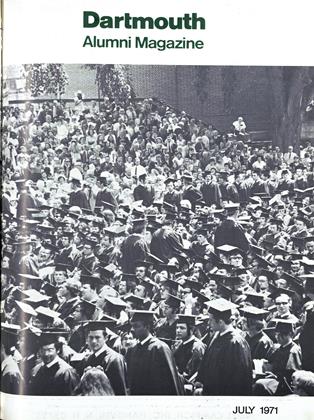By Edwin G. Dolan (Instructor ofEconomics). New York: Holt, Rinehartand Winston, Inc., 1971. 115 pp. $3.50.
No Utopian plans, no ecological evangelism, just pay your own way and let things float in a free marketplace. Mr. Dolan's book presents an encouraging prospect to those who believe that the laws of economics contain within themselves the seeds of their own refinement. His thesis asserts: gross national product is a poor estimate of economic health that must be dissected into BNP I (produced from renewable resources and recyclable wastes) and GNP II (produced by exploiting irreplaceable substrates and depositing persistent debris). Only through maximizing GNP I can economic expansion be seen as progress. Our present emphasis on the GNP II component pauperizes ourselves and our posterity. This brief book contains a series of suggestions for solving the "environmental crisis" that avoid the dangers of altruism, elitist regulation, or a planned economy.
A brief introduction to economic theory, explaining marginalism, efficiency, equimarginality, and the market principle in terms convenient for laymen (including biologists) prefaces a discussion of the economics of pollution, population, development, and conservation. The paramount emergent theme is "Pay your own way." Whether by licenses to pollute for industries, sale of parklands to conservation groups, a carefully hands-off solution to population control, or selective aid to marginal economies (letting massive die-off solve the population problem), the principles of the free market emerge as the saving factors of civilization. Man and nature are presented as equal partners in the competition for energy. Each with its own supply of capital, its own information stores, and its own means of transducing solar energy.
But are man and nature equal? As a biologist, I wonder. Man and his economy do not exist apart from nature; they are of it. At its base, human effort and production is only quantitatively different from that of an unconscious organism.
This book has much in it to make a biologist think and much that should make the ecological evangelists pause, but it begs such important biological issues as the mutagenic action of wastes, the physiology of crowding, the importance of sensation in brain development, and the role of complexly in ecological stability.
I recommend Mr. Dolan's book, but doubt that he has proven his contention.
Dartmouth Professor of Biology and Chairman of the Freshman Seminar Program, Mr.oos teaches Introduction to Biology, Lifeciences, Endocrinology, and a seminar inGeneral Biology.
 View Full Issue
View Full Issue
More From This Issue
-
 Feature
FeatureThe Commencement Address
July 1971 By GUNNAR MYRDAL, Sc.D. '71 -
 Feature
FeatureAlumni Council Honors Seven
July 1971 -
 Feature
FeatureThe Fifty-Year Address
July 1971 By JOHN L. SULLIVAN '21 -
 Feature
FeatureHONORARY DEGREE CITATIONS
July 1971 By honoris causa. -
 Feature
FeatureCOMMENCEMENT 1971
July 1971 By CHARLES J. KERSHNER -
 Feature
FeatureMcCulloch Heads Council
July 1971
THOMAS B. ROOS
Books
-
 Books
BooksThe article on English
April 1933 -
 Books
BooksTHE EAGLE AND THE BEAR
July 1950 By Francis W. Gramlich -
 Books
BooksECONOMIC PRINCIPLES IN PRACTICE,
May 1942 By G. W. WoodWorth -
 Books
BooksThe Peacemakers of 1864
JANUARY, 1928 By H. Donald Jordan -
 Books
BooksMAN OF GOD
November 1941 By Roy B. Chamberlin -
 Books
BooksTHE EXCURSION. A STUDY,
May 1950 By Vernon Hall Jr.



